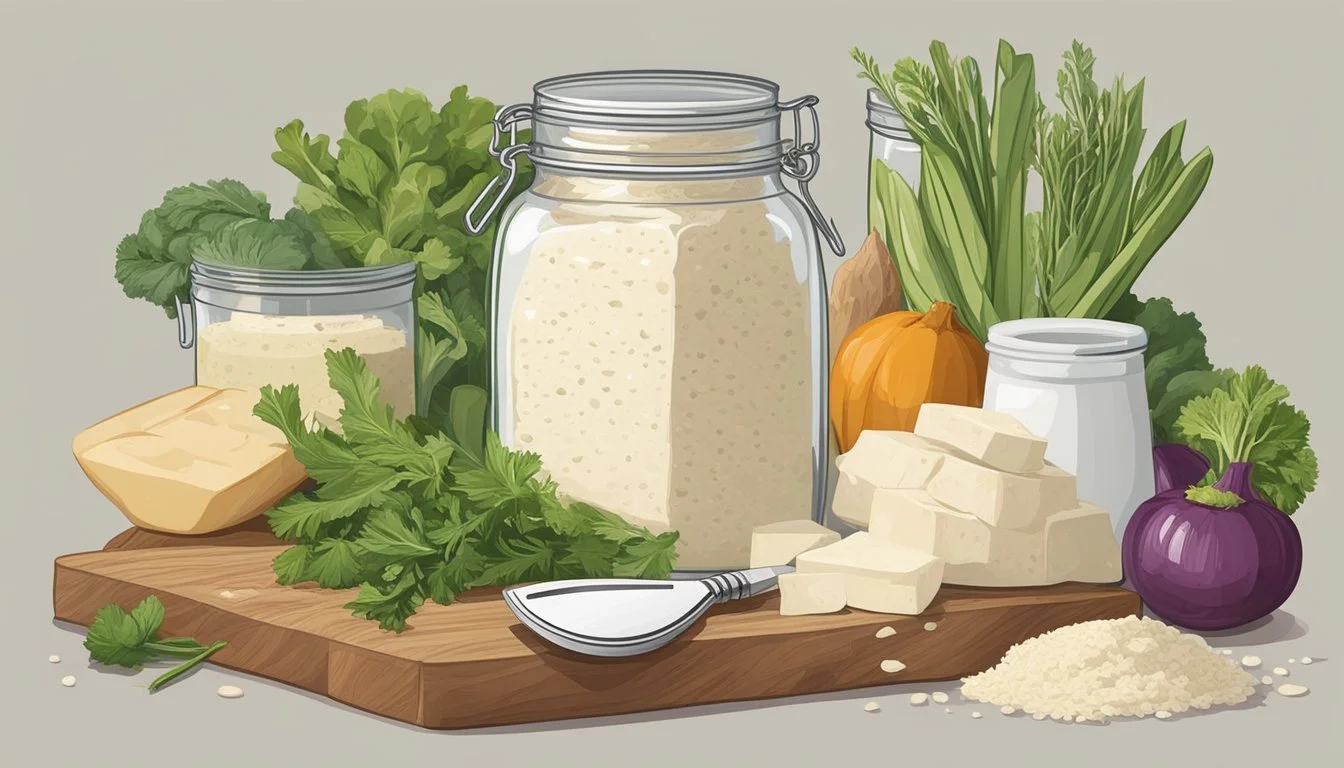Horseradish Substitutes
Top Alternatives for Every Recipe
When it comes to finding the perfect horseradish substitute, there are several options that deliver a similar sharp and pungent kick to elevate your dishes. One of the best choices is wasabi, which provides a cleaner heat with a slightly green vegetal flavor, making it an excellent stand-in for fresh horseradish.
Alternatively, if you're looking for something less intense, spicy brown mustard and daikon radish cater to various flavor profiles and heat levels without compromising on taste. These substitutes can seamlessly replace horseradish in recipes, offering versatility and convenience.
Knowing your preferences and understanding the dish you're preparing can help you select the most appropriate substitute. Experimenting with different substitutes can lead to surprising and delightful culinary results, ensuring your meals are never bland.
Understanding Horseradish
Horseradish is a root vegetable known for its pungent flavor and versatile culinary uses. It is commonly used fresh, as a prepared condiment, or in various sauces to enhance the taste of dishes like prime rib and sandwiches.
Characteristics of Horseradish
Horseradish is a white root vegetable with a rough exterior. Its flavor is known for its sharp, pungent, and spicy qualities, which come from compounds released when the root is grated or crushed. These compounds, known as isothiocyanates, are responsible for the intense heat and aroma.
When freshly grated, horseradish can cause a strong, sinus-clearing sensation. Prepared horseradish, which is grated and mixed with vinegar and salt, has a more subdued flavor. Texture varies from the firm and slightly fibrous fresh root to the creamy consistency of prepared and horseradish sauce.
Culinary Uses of Horseradish
Horseradish is a staple ingredient in many cuisines, particularly in Eastern European and American cooking. It is often used to enhance meats such as prime rib, due to its ability to cut through rich flavors. Horseradish sauce is a popular accompaniment for roast beef and sandwiches.
In addition to savory dishes, horseradish is fundamental in making classic cocktail sauce, providing the signature heat that complements seafood. It is also a key ingredient in the famous Bloody Mary cocktail, adding a spicy kick. Whether used fresh, prepared, or in a creamy sauce, horseradish offers a distinctive and bold flavor to various recipes.
Choosing Horseradish Substitutes
When selecting a substitute for horseradish, the primary considerations include flavor, texture, and appearance. Factors such as availability, dietary preferences, and the specific recipe requirements also play crucial roles.
Factors to Consider
Flavor: Flavor is the most critical aspect when choosing a horseradish substitute. Alternatives like wasabi, spicy mustard, or ginger can mimic the heat and pungency. However, each substitute also introduces unique flavors. For instance, wasabi offers a sharp, peppery taste while spicy brown mustard provides a tangy flavor.
Texture: Texture should align with the intended use. Horseradish sauce or prepared horseradish substitutes like grated radish or wasabi paste work well in sauces and dressings. For dishes requiring grated horseradish, fresh daikon or black radishes can be used.
Appearance: The visual aspect can influence the choice of substitute, especially in recipes where presentation matters. For example, grated white radish can replace horseradish in recipes requiring a white, grated component. Pickled daikon can serve a similar role in both color and consistency.
Popular Horseradish Substitutes
Several ingredients can mimic the pungent and spicy flavor of horseradish, making them suitable for various dishes. These substitutes can be used in sauces, salads, marinades, or with roasted veggies.
Using Wasabi as a Substitute
Wasabi is a popular horseradish substitute often used in Japanese cuisine, especially with sushi. Wasabi root, wasabi paste, and wasabi powder each offer varying levels of heat and flavor intensity. One teaspoon of wasabi can replace one teaspoon of horseradish.
Wasabi imparts a sharp, spicy flavor similar to horseradish, making it perfect for sauces and dressings. Wasabi paste is convenient for immediate use, while wasabi powder can be mixed with water to create a fresher taste.
Mustard Varieties as Alternatives
Mustard is another excellent substitute for horseradish, with options like spicy brown mustard, Dijon mustard, Chinese hot mustard, and mustard oil. These varieties can be used in a 1:1 ratio to replace horseradish.
The pungency of mustard seeds and mustard powder can mimic the sharpness of horseradish. For instance, brown mustard works well in salads and marinades, while Dijon mustard is ideal for dressings. Chinese hot mustard offers a strong kick, suitable for sauces.
Ginger Root and Its Uses
Fresh ginger root is a versatile substitute, providing a unique twist to recipes requiring horseradish. Its slightly sweet and spicy flavor works well in marinades, salads, and dressings.
To use ginger as a substitute, finely grate or mince it. While it does not perfectly replicate horseradish’s pungency, ginger adds a warm and aromatic flavor that enhances various dishes. Incorporating ginger into roasted veggies can elevate their taste profile.
Additional Vegetable Substitutes
Other vegetables like black radish, daikon, parsnip, and red radish can serve as substitutes for horseradish. These vegetables can be used raw or cooked in different dishes.
Daikon is milder but can still provide the necessary bite when grated into salads or sauces. Black radish offers a stronger, peppery flavor, suitable for raw applications. Parsnip can add a slight sweetness to dressings and marinades, and red radish’s crispy texture works well in salads.
Non-Vegetable Substitutes
When substituting horseradish in various recipes, it's possible to use a range of non-vegetable options that maintain the essential heat and flavor. These alternatives primarily include various sauces, spices, and dairy products that can offer similar taste experiences.
Taking Advantage of Sauces and Dressings
Condiments like cocktail sauce, often containing horseradish, can serve as an effective substitute. This sauce's tangy and spicy profile works well with seafood and meats. Hot sauce is another alternative, providing heat and tanginess, though it lacks the specific root flavor. Mixing mayonnaise with a small amount of hot sauce or vinegar can emulate the creamy and spicy characteristics of horseradish sauce, ideal for dressings or as a spread.
Utilizing Spices and Flavorings
For those wanting to replicate horseradish’s heat using spices, horseradish powder is a direct non-vegetable substitute. A blend of chili powder and ground mustard seeds also recreates this effect. These spices can provide the desired peppery flavor and intensity. Adding a pinch of black pepper or even a few drops of vinegar can enhance the spice blend, creating a more complex flavor profile.
Using Dairy to Mimic Texture
To mimic the texture of horseradish, sour cream and mayonnaise are excellent options. These dairy products can smooth the overall texture while delivering a mild heat when combined with other spicy elements. Mixing sour cream with hot sauce or a small quantity of ground mustard can produce a creamy and spicy substitute suitable for dressings, dips, or sauces. Mayonnaise offers a thicker texture, which is useful in spreads or as a base for other flavors.
Horseradish Substitute Applications
When looking for alternatives to horseradish, various substitutes can be used based on specific culinary applications. These options range from wasabi and mustard for a similar kick to daikon radish for a milder taste. Below are detailed applications of different horseradish substitutes across various types of dishes.
Meat and Seafood Dishes
Substitutes like wasabi and spicy brown mustard work well in meat and seafood dishes. For beef dishes like prime rib, using wasabi paste can provide an intense heat similar to horseradish.
Grated ginger or black radish can also be used for a unique flavor twist. In seafood, wasabi pairs brilliantly with sushi or sashimi, while horseradish sauce can be swapped out for cocktail sauce in raw oyster dishes.
Salads and Vegetables
For salads and roasted veggies, milder substitutes like daikon radish or red radish are excellent choices. These radishes add a slight peppery bite without overwhelming the dish.
Sauerkraut can also be incorporated into salads for a tangy, fermented taste. Deviled eggs can benefit from a blend of mayonnaise and prepared mustard instead of horseradish for a creamy, balanced flavor.
Beverages and Cocktails
Bloody Marys often call for the heat of horseradish. A strong wasabi or sriracha can replicate this effect. Wasabi adds an intriguing twist to the classic cocktail, ensuring the drink retains its spicy kick.
In other cocktails, a small amount of grated ginger can provide a milder yet flavorful substitute, making the drink refreshing and zesty.
Condiments and Spreads
For spreadable condiments, horseradish sauce itself can be easily substituted. Combine mayonnaise and sour cream with a touch of wasabi or mustard for a creamy alternative.
This blend works well in sandwiches, on burgers, or as a sauce for dipping. For a slightly tangy spread, sauerkraut mixed with mustard or daikon radish adds crunch and a milder spice.
By choosing appropriate substitutes based on the type of dish, you can easily maintain the desired flavors and heat levels without compromising on taste or texture.
Special Considerations
When choosing horseradish substitutes, it's critical to consider dietary restrictions, allergies, cultural contexts, and the seasonal availability of alternative ingredients.
Dietary Restrictions and Allergies
Certain substitutes for horseradish may not be suitable for individuals with specific dietary restrictions or allergies.
For example, wasabi and wasabi paste often contain food coloring and additives, which could be problematic for some.
Likewise, spicy brown mustard may contain wheat or other allergens.
Ginger is a safe and mild alternative for those who might have sensitivities to stronger spices.
Horseradish sauce can sometimes contain dairy, so it's important to check labels if one is lactose intolerant.
For those observing kosher dietary laws, ensuring that substitutes are kosher-certified, especially during Passover, is essential.
Cultural and Seasonal Usage
The use of horseradish and its substitutes can vary widely based on cultural and seasonal practices.
Wasabi, for instance, is a staple in Japanese cuisine, often accompanying sushi.
In Eastern European countries, sauerkraut serves as a traditional side for meats and sausages.
During Passover, horseradish is used in the Seder plate, symbolizing the bitterness of slavery.
Seasonal availability can also influence choice; fresh daikon radish might be available in winter, while black radishes are common in spring.
Selecting the right substitute involves considering not only flavor profiles but also cultural significance and timing.





